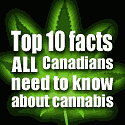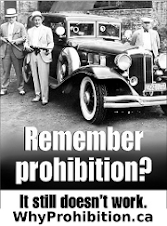Update: Eric @ showmethefacts.org gives you the lowdown, aka, the facts, regarding John Walters and his "Stats". Go read it. It's awesome.
Last night (May 6/2009) on AC 360, Anderson Cooper's guests discussing the re- legalization of Cannabis were Harvard Economist Jeffrey Miron, and John Walters, former President George Bush's "Drug Czar".
The following is the Transcript of the segment. While I'm quite confident that Mr. Miron can back up everything he says, where John Walters is getting his statistical information is beyond me. He used one that was "60, 70, 80%"
John Walters -" Studies have now shown 60, 70, 80 percent of the people who are arrested for violent crime have drugs in their body. One of the most prevalent drugs they have in their body are marijuana."
And what do you think of Walters statement: ... "In California, where medical marijuana has been used as a kind of a wedge issue, or kind of phony effort to try to say, "It's only going to go to people who are sick."...
Medical Marijuana - a "phony effort"?
And as far as Drug opponents disagreeing with Legalization, saying any new revenue could be swallowed by new problems for law enforcement and health officials, in my opinion they are discounting the fact that millions and millions are already using it. The damage created by the war on drugs far outweighs the effects of the plant itself.
My favourite part is at the end, where Miron responds to Walters statement of increased non-medical use because of more medical marijuana dispensaries in California.
Jeffrey Miron - "But if there's been an increase in use, then where's the surge in violence? California is just as peaceful and just as normal a place as it's been for a long time, despite this alleged surge in use from the medicinal marijuana. So then, doesn't support the claims being made by the prohibitionist in any way, shape or form.
Hopefully the video of the segment will be posted soon, until then, here is the full transcript.
I'm sending it right on over to Eric @ ShowMeTheFacts.org.... if there is anyone who knows just how to handle a discussion like this, it's him.
UPDATE: Video has been posted, hat tip to @NatlNORML on Twitter for posting the link.
AC 360 Transcript:
Also ahead tonight in California, the growing debate over marijuana. It seems just about every politician has an idea on how to get the economy going again, but few have generated the reaction that Governor Arnold Schwarzenegger is getting tonight. And here's why.
The California governor thinks it's time to talk about making marijuana legal. Now, this is him back in 1977 in the movie "Pumping Iron." You can see him smoking a joint right there. Two years ago he told the British version of "GQ" magazine that is not a drug; it's a leaf. The spokesman downplaying the remark at the time as a joke.
But now he's speaking out as governor, favoring a debate over legalization. Not because it might reduce violence or make the border safer, but because it might create more revenue. Tom Foreman has more.
(BEGIN VIDEOTAPE)
TOM FOREMAN, CNN CORRESPONDENT (voice-over): Nearly 15 million Americans smoke marijuana each month. The U.S. government says 44 percent of high school seniors have tried it, and some adults openly use it.
UNIDENTIFIED MALE: Yes, I do. I'm not afraid to admit that.
FOREMAN: Now amid rumbles that legalizing and taxing marijuana could bring California $1.3 billion a year, lawmakers there are considering just that. A poll shows voters favor it, and the governor wants to talk it over.
GOV. ARNOLD SCHWARZENEGGER (R), CALIFORNIA: And I think that f we study very carefully on what other countries are doing that have legalized marijuana.
FOREMAN: In New York, the Drug Policy Alliance, encouraged by more than a dozen states that have already approved medicinal marijuana, has long argued for full legalization, comparing the costly war on drugs to prohibition.
ETHAN NADELMANN, DRUG POLICY ALLIANCE: The No. 1, two, and three factors that brought alcohol prohibition to a rapid end in 1933 were the depression, the depression, the depression. And what's driving things very quickly right now with ending marijuana prohibition is the recession, the recession, and the fear of another depression.
FOREMAN (on camera): Drug opponents disagree, saying any new revenue could be swallowed by new problems for law enforcement and health officials. Because, as the marijuana trade has grown lucrative, the drug itself has been reengineered to be stronger.
(voice-over) Drug Watch International is a nonprofit group against legalization.
JOHN COLEMAN, DRUG WATCH INTERNATIONAL: No question about it. I mean, it's the difference between having maybe a 4 ounce glass of beer versus an 8 ounce glass of Jack Daniels. It's far more potent today than it was back in the '60s.
FOREMAN: The president himself doubts the positive economic impact of legalization.
BARACK OBAMA, PRESIDENT OF THE UNITED STATES: I don't think that is a good strategy to grow our economy.
FOREMAN: But the drum beat to consider it is growing.
Tom Foreman, CNN, Washington.
(END VIDEOTAPE)
COOPER: What do you think? Would making marijuana legal help our economy? Send us a text message with your question to 94553. The message has to start with the letters "AC", then a space, then your name and question. If you don't include "AC" first and then a space, we're not going to get the text.
Let's talk -- let's talk about the issue right now. Joining us tonight Jeffrey Miron, a senior economics lecturer at Harvard University. He's for legalization. And against it John Walters, executive vice president of the Hudson Institute. He's also the former drug czar under President George W. Bush.
John, people who want to see marijuana legalized say it's not addictive as other drugs are, that it doesn't increase violence, and by some estimates legalizing it could bring up to $7 billion of income a year to the government. You don't buy that?
JOHN WALTERS, EVP, HUDSON INSTITUTE: Well, I don't think the facts sustain that. I mean, the fact is that marijuana is the single biggest cause of treatment need among illegal drugs in America based on the same -- on the same studies you talked about.
We just ran an earlier piece on this show about violence in Chicago and the killing of kids that are students in elementary school and middle school and high school. Police made the point, drugs are a factor in this. Guns, violence, and out-of-control behavior that fuels and is made worse by drugs.
We already have too many people who suffer from dependency and addiction. Having more people who use only makes that worse. And would the country be better if, instead of 14 million users, as you talked about in the setup piece, you had 20, 30, 40, 50 million users?
COOPER: Jeffrey, what about that? Would legalizing marijuana increase violence? JEFFREY MIRON, SENIOR ECONOMICS LECTURER, HARVARD UNIVERSITY: Absolutely not. There's not a shred of evidence or any good reason to think that legalizing marijuana would increase violence. Just the opposite.
Most of the violence we associate with marijuana is because, when you force a trade underground, people in that trade resolve their disputes with guns rather than with lawyers and advertising, the things that people do in legal industries. So it's prohibition that's creating the violence, not marijuana creating the violence. It's just completely preposterous to suggest that marijuana use causes violence.
COOPER: John, what about the economic argument, though, that this would help our economies?
WALTERS: Well, first let's talk about the violence. Studies have now shown 60, 70, 80 percent of the people who are arrested for violent crime have drugs in their body. One of the most prevalent drugs they have in their body are marijuana.
There's this view that people who smoke marijuana are kind of cute Cheech and Chong characters from old-time movies. In fact, it's a source of agitation. It's a source of impaired judgment. It's a source of, in some cases, making people whose behavior already erratic get more erratic. So the greater potency has something to do with that.
The revenue that you would get from having tens of millions of more marijuana users is going to be offset by the cost of this to society. The cost not only in addiction treatment, but also the lost productivity of those individuals, the damage.
Let's think of it this way: many of our families have experience with this. They have loved ones who have had suffered from substance abuse. Many of them from marijuana dependency, many polydrug dependency. Many alcoholism and marijuana. How many of those families think America or their family or their community would be better off with more of that?
COOPER: Jeffrey, what do you think?
MIRON: The key assumption is being made by Mr. Walters is just completely not supported by the evidence, is that legalizing it would lead to some dramatic increase in use. The evidence suggests that there would be, at best, modest increases in use, and those increases that occur would be from responsible moderate users, just as we observed with legal alcohol.
For alcohol we have a huge range of potency. The vast majority of people don't consume extremely potent forms of alcohol, and they don't do the -- there are less potent ones to excess (ph). The vast majority use responsibly. That's exactly what we should expect and what the evidence suggests would be true of marijuana.
COOPER: John, we've got a -- we've got a text question from John in Pennsylvania. He asks, "Won't legalizing marijuana get petty offenders out of our already-crowded jail system?"
WALTERS: Well, in fact, there is an old wives' tale view that possession offenders are a big part of the jail system. In fact, there are 0.3 percent of those in the state prisons, the largest prison population, are there for simple possession of marijuana. Most people are there for violent crimes. Drugs and violence do fit together.
But let me go back to the professor's point about there won't be more use. In California, where medical marijuana has been used as a kind of a wedge issue, or kind of phony effort to try to say, "It's only going to go to people who are sick." It's not going to people who are sick. In fact, in San Francisco it has been reported in the news there are now more marijuana dispensaries than there are Starbucks in downtown San Francisco.
That's more use under a regime that's already halfway disassembled. If you took the lid off altogether, there are 100 million people who drink alcohol once a month or more frequently, and there are about 13 million who are needing treatment for alcoholism.
There are 20 million who use an illegal drug. Most of them use marijuana once a month or more frequently, and a third of them need treatment.
COOPER: We're almost out of time. I just want to give Jeffrey the chance to respond to that -- Jeff.
MIRON: Well, the mere fact that these medical marijuana dispensaries may be dispensing widely to people who are using for reasons other than medicinal is undoubtedly valid. But if there's been an increase in use, then where's the surge in violence? California is just as peaceful and just as normal a place as it's been for a long time, despite this alleged surge in use from the medicinal marijuana. So then, doesn't support the claims being made by the prohibitionist in any way, shape or form.
COOPER: We do have to end it there. I'm sorry. It's a fascinating debate and one we want to continue having.
John Walters, appreciate your time.
And Jeffrey Miron, as well. Thank you.
Let us know what you think. You can join the live chat right now at AC360.com. And also, Erica Hill's broadcasting during our commercial breaks there.
Thursday, May 7, 2009
Show Me The Facts
Posted by
MaryJane Cannabian
at
3:44 PM
LABELS -
420,
Activism,
California,
Cannabis,
Economy,
Governor Schwarzenegger,
Law,
Marijuana,
Medical Marijuana,
Miron,
Pot,
Prison,
Prohibition,
The War on Drugs,
Tommy Chong,
Walters,
Weed


Subscribe to:
Post Comments (Atom)















No comments:
Post a Comment
High! Thanks for taking the time to leave a Comment. :)